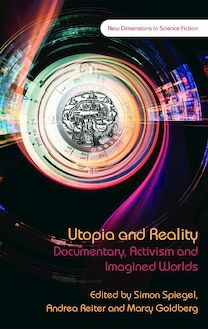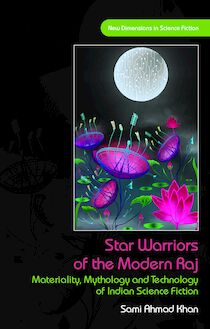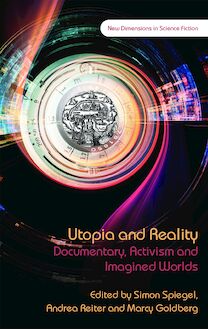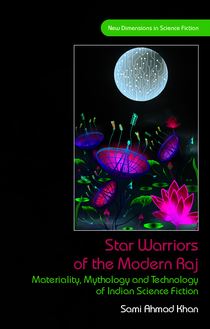-
 Univers
Univers
-
 Ebooks
Ebooks
-
 Livres audio
Livres audio
-
 Presse
Presse
-
 Podcasts
Podcasts
-
 BD
BD
-
 Documents
Documents
-
- Cours
- Révisions
- Ressources pédagogiques
- Sciences de l’éducation
- Manuels scolaires
- Langues
- Travaux de classe
- Annales de BEP
- Etudes supérieures
- Maternelle et primaire
- Fiches de lecture
- Orientation scolaire
- Méthodologie
- Corrigés de devoir
- Annales d’examens et concours
- Annales du bac
- Annales du brevet
- Rapports de stage
La lecture à portée de main
Vous pourrez modifier la taille du texte de cet ouvrage
Découvre YouScribe en t'inscrivant gratuitement
Je m'inscrisDécouvre YouScribe en t'inscrivant gratuitement
Je m'inscrisEn savoir plus
Vous pourrez modifier la taille du texte de cet ouvrage
En savoir plus

Description
This study draws from postcolonial theory, science fiction criticism, utopian studies, genre theory, Western and Indian philosophy and history to propose that Indian science fiction functions at the intersection of Indian and Western cultures. The author deploys a diachronic and comparative approach in examining the multilingual science fiction traditions of India to trace the overarching generic evolutions, which he complements with an analysis of specific patterns of hybridity in the genre’s formal and thematic elements – time, space, characters and the epistemologies that build the worlds in Indian science fiction. The work explores the larger patterns and connections visible despite the linguistic and cultural diversities of Indian science fiction traditions.
Acknowledgements
Chronology
Introduction: To Mark or Not to Mark Territories
1. Genealogies: A Brief History of Indian SF
2. Cognitions and Estrangements: Epistemes and the World-Building in Indian Sf
3. Other Times: Alternative Histories, Imagining the Future and Non-Linear Temporalities
4. Other Spaces: Utopian Discourses and Non-Expansionist Journeys
5. The Others: Aliens, Robots, Cyborgs and Other Others
Conclusion: Close Encounters
Notes
Bibliography: Primary Texts
Bibliography: Secondary Texts
Sujets
Informations
| Publié par | University of Wales Press |
| Date de parution | 15 octobre 2020 |
| Nombre de lectures | 0 |
| EAN13 | 9781786836687 |
| Langue | English |
Informations légales : prix de location à la page 0,3750€. Cette information est donnée uniquement à titre indicatif conformément à la législation en vigueur.
Extrait
New Dimensions in Science Fiction
Indian Science Fiction
New Dimensions in Science Fiction
Series Editors
Professor Pawel Frelik
University of Warsaw
Professor Patrick B. Sharp
California State University, Los Angeles
Editorial Board
Grace Dillon
Portland State University
Tanya Krzywinska
Falmouth University
Isiah Lavender III
University of Georgia
Roger Luckhurst
Birkbeck University of London
John Rieder
University of Hawai‘i
Indian Science Fiction
Patterns, History and Hybridity
Suparno Banerjee
© Suparno Banerjee, 2020
All rights reserved. No part of this book may be reproduced in any material form (including photocopying or storing it in any medium by electronic means and whether or not transiently or incidentally to some other use of this publication) without the written permission of the copyright owner except in accordance with the provisions of the Copyright, Designs and Patents Act 1988. Applications for the copyright owner’s written permission to reproduce any part of this publication should be addressed to the University of Wales Press, University Registry, King Edward VII Avenue, Cathays Park, Cardiff, CF10 3NS.
www.uwp.co.uk
British Library CIP Data A catalogue record for this book is available from the British Library.
ISBN 978-1-78683-666-3 eISBN 978-1-78683-668-7
The right of Suparno Banerjee to be identified as author of this work has been asserted in accordance with sections 77 and 79 of the Copyright, Designs and Patents Act 1988.
The publisher has no responsibility for the persistence or accuracy of URLs for any external or third-party internet websites referred to in this book, and does not guarantee that any content on such websites is, or will remain, accurate or appropriate.
Cover image: Debangana Banerjee, Home-World (2020), mixed media on paper © the artist.
For Irabati You are the future
Series Editors’ Preface
Science fiction (SF) is a global storytelling form of techno-scientific modernity which conveys distinct experiences with science, technology and society to a wide range of readers across centuries, continents and cultures. The New Dimensions in Science Fiction series aims to capture the dynamic, worldwide and media-spanning dimensions of SF storytelling and criticism by providing a venue for scholars from multiple disciplines to explore their ideas on the relations of science and society as expressed in SF.
Contents
Acknowledgements
A Brief Chronology of Indian Science Fiction
Introduction: To Mark or Not to Mark Territories
Defining SF
Defining ‘Indian’
The Trajectory
1 Genealogies: A Brief History of Indian SF
1835–1905: Revolutionary Futures, Scientific Education and Influence of Western SF
1905–47: Utopias, Popular Culture and Experimentations
1947–95: The Golden Age of SF in Indigenous Languages, Rebirth of Indian English SF and SF on Screen
1995–2019: The Rise of Indian English SF, Globalisation, SF Films and Web Mags
Conclusion
2 Cognitions and Estrangements: Epistemes and World Building in Indian SF
Knowledge, Science and Science Fiction
Science and Fiction
Vedic Science and Fiction
Subaltern Science and Fiction
SF and the Mythological Paradigm
Reinterpreting Hindu Myths
Indian SF and Non-Hindu Myths
Conclusion
3 Other Times: Alternative Histories, Imagining the Future and Non-linear Temporalities
Alternative Histories
Other Tomorrows
The Present, Forking Paths and Non-linear Temporalities
Conclusion
4 Other Spaces: Utopian Discourses and Non-expansionist Journeys
Indian SF and Utopian Discourses
Indian SF and Space Travel
Conclusion
5 The Others: Aliens, Robots, Cyborgs and Other Others
The Other as the Self
The Other as the Other
Conclusion
Conclusion: Close Encounters
Notes
Bibliography: Primary Texts
Bibliography: Secondary Texts
Acknowledgements
Writing a book about Indian literature is daunting, to say the least, and would not have been possible without help from many friends, family and colleagues. I thank Sarah Lewis of University of Wales Press and Patrick B. Sharp, series editor of New Dimensions in Science Fiction, for their guidance in navigating through the publication process. I am highly indebted to my friend Tanja Stampfl, who read the whole manuscript and provided invaluable comments. I am grateful to Eric Smith, Amy J. Ransom, Himadri Lahiri and Rich Cooper for their valuable feedback on several chapters. Their suggestions greatly helped me in revising the manuscript. I am thankful to Texas State University for providing me with a one-semester sabbatical and a Research Enhancement Grant for this project. I must thank the National Library at Kolkata, Visva-Bharati Central Library and Bangiya Sahitya Parishad for giving me access to their respective archives. I thank Sudev P. Basu, Samantak Das, Anindita Bandyopadhyay, Amrit Sen and Arpita Chatterjee for their help in this matter. Anil Menon, Sanjib Mukhopadhyay, Dhrijoti Kalita, Arnab Ganguly and Hiranmoy Lahiri helped me find many books, stories and articles. I thank them heartily. I must also thank my parents Subir and Haimanti Banerjee for preserving old Bengali journals and books at my home in Santiniketan. Thanks also to Amit Rahul Baishya, Sami Ahmad Khan, Arvind Mishra, Srinarahari and Rob Tally for their reading and research-related suggestions.
This book draws on many of my previously published articles and book chapters. The following are the principal ones among them, and I am thankful to the editors and publishers for their permission to reprint and reuse large portions from these chapters and articles: Liverpool University Press for ‘An Alien Nation: Postcoloniality and the Alienated Subject in Vandana Singh’s Science Fiction’, published in Extrapolation: A Journal of Science Fiction and Fantasy, 53/3 (2012); University Press of Mississippi for ‘India, Geopolitics, and Future Wars’, published in Isiah Lavender III’s edited anthology Dis-Orienting Planets: Racial Representations of Asia in Science Fiction (2017); and Brian Attebery for ‘Alternative Dystopia: Science, Power, and Fundamentalism in Rimi B. Chatterjee’s Signal Red’, published in Journal of the Fantastic in the Arts, 20/1 (2009) and ‘Ruptured Bodies and Invaded Grains: Biotechnology as Bioviolence in Indian Science Fiction’, published in Journal of the Fantastic in the Arts, 26/1 (2015).
I want to thank my two mentors Carl Freedman and Pallavi Rastogi for helping me form the germs of this project when I was still writing my dissertation at Louisiana State University. I should also acknowledge my colleagues in the field of science fiction studies, especially those working with Indian science fiction, for creating the critical mass on which I depend for formulating my ideas. You continue to inspire me. And last but not the least, I thank my wife Debangana and daughter Irabati for not ostracising me outright for all the time I ignore them in favour of SF. Nothing I do would be possible without their unconditional support.
A Brief Chronology of Indian Science Fiction
1835 Kylas Chunder Dutt’s ‘A Journal of Forty-Eight Hours of the Year 1945’, first Indian future history fiction and one of the earliest Indian English fictions
1845 Shoshee Chunder Dutt’s ‘The Republic of Orissa: A Page From the Annals of Twentieth Century’, second future history fiction
1882 Hemlal Dutta’s ‘Rahasya’ (Bangla), first narrative of technology and automation
1884–8 Pandit Ambika Datta Vyasa’s ‘Ascharya Vrittant’ (Hindi), first adventure science fiction (SF)
1892 ‘Shukra Bhraman’ (Bangla) written by Jagadananda Roy, first space travel story; published in 1914
1896 ‘Niruddesher Kahini’ (Bangla) written by Jagadish Chandra Bose for a short-story competition, first narrative functioning on exploitation of a specific scientific principle; later published as ‘Palatak Tufan’ in 1921
1900 Keshav Prasad Singh’s ‘Chandralok Ki Yatra’ (Hindi), first lunar-journey story; Hindi magazine Saraswati starts publication
1905 Begum Rokeya Shakhawat Hossain’s ‘Sultana’s Dream’, first feminist utopia
1908 Nath Madhav’s ‘Srinivasa Rao’, possibly the first Marathi SF
1913 Start of publication of Bangla children’s magazine Sandesh
1915 Anadidhan Banerjee’s ‘Mangal Graha’ (Hindi), possibly the first Mars story
1922 Sukumar Ray’s ‘Heshoram Hushiyarer Diary’ (Bangla)
1924 Rahul Sankrityayan’s socialist utopia Baisvee Sadi (Hindi)
1925 Hemendra Kumar Roy’s first SF, Meghduter Marte Agaman (Bangla)
1945 Premendra Mitra’s first Ghanada story ‘Mosha’ (Bangla)
1946 Kumudeswar Borthakur’s ‘Atom Boma’, possibly the first Assamese SF
1948 First publication of Hindi magazine Dharmayug
1952 William Berke’s Kaadu/The Jungle (Tamil/English), first partially Indian SF movie
1961 Satyajit Ray’s ‘Byom Jatrir Diary’, first Professor Shanku story
1963 First publication of Ascharya (Bangla) by Adrish Bardhan, the first SF magazine in India A. Kasilingam’s Kalai Arasi (Tamil), first Indian SF film
1965 Rajshekhar Bhoosnurmath’s ‘Holiday Planet’, possibly first Kannada SF
First SF film club in India starts in Kolkata under the guidance of Satyajit Ray
1971 First publication of Pran’s Chacha Chaudhary comics (Hindi)
1974 Jayant Vishnu Narlikar’s first SF ‘Krishna Bibar’ (Marathi) The Marathi Vidnyan Parishad launches SF writing competition to promote science education
1975 First publication of Bangla SF magazine Fantastic Salman Rushdie’s Grimus
1976 Leela Majumdar’s ‘Akash Ghanti’ (Bangla)
1980 Sujatha’s En Iniya Iyanthira (Tamil)
1986 Space City Sigma , first Indian SF TV show
1987 Shekhar Kapur’s film Mr. India
1989 Narlikar’s Vaman Parat Na Ala (Marathi)
1993 Bal Phondke edited It Happened Tomorrow , first collection of regional SF translated into English
1995 Amitav Ghosh’s The Calcutta Chromosome Establishment of Indian Science Fiction Writers Association
1997 Manjula Padmanabhan’s Harvest wins Onassis Interna
-
 Univers
Univers
-
 Ebooks
Ebooks
-
 Livres audio
Livres audio
-
 Presse
Presse
-
 Podcasts
Podcasts
-
 BD
BD
-
 Documents
Documents
-
Jeunesse
-
Littérature
-
Ressources professionnelles
-
Santé et bien-être
-
Savoirs
-
Education
-
Loisirs et hobbies
-
Art, musique et cinéma
-
Actualité et débat de société
-
Jeunesse
-
Littérature
-
Ressources professionnelles
-
Santé et bien-être
-
Savoirs
-
Education
-
Loisirs et hobbies
-
Art, musique et cinéma
-
Actualité et débat de société
-
Actualités
-
Lifestyle
-
Presse jeunesse
-
Presse professionnelle
-
Pratique
-
Presse sportive
-
Presse internationale
-
Culture & Médias
-
Action et Aventures
-
Science-fiction et Fantasy
-
Société
-
Jeunesse
-
Littérature
-
Ressources professionnelles
-
Santé et bien-être
-
Savoirs
-
Education
-
Loisirs et hobbies
-
Art, musique et cinéma
-
Actualité et débat de société
- Cours
- Révisions
- Ressources pédagogiques
- Sciences de l’éducation
- Manuels scolaires
- Langues
- Travaux de classe
- Annales de BEP
- Etudes supérieures
- Maternelle et primaire
- Fiches de lecture
- Orientation scolaire
- Méthodologie
- Corrigés de devoir
- Annales d’examens et concours
- Annales du bac
- Annales du brevet
- Rapports de stage
















